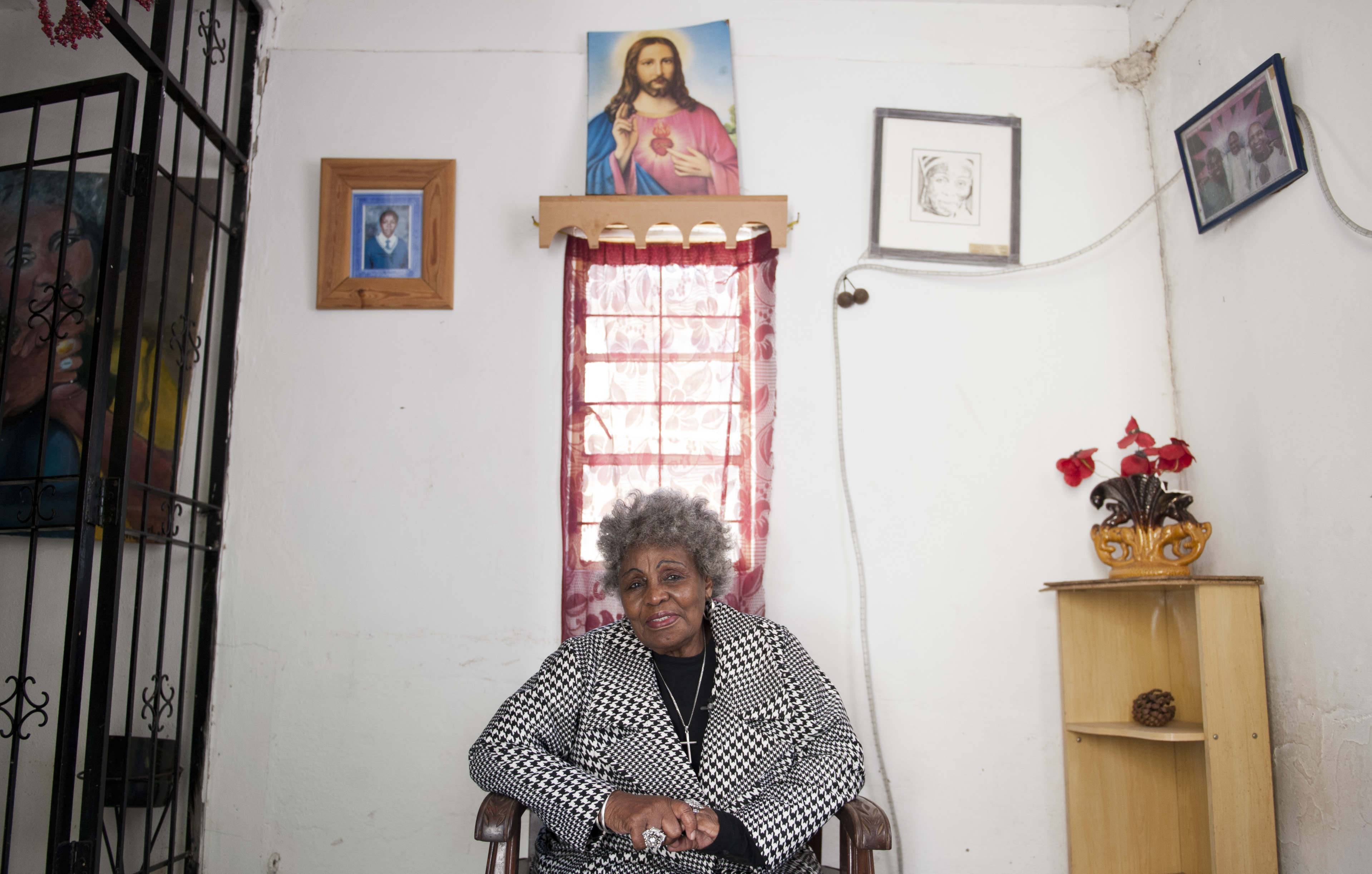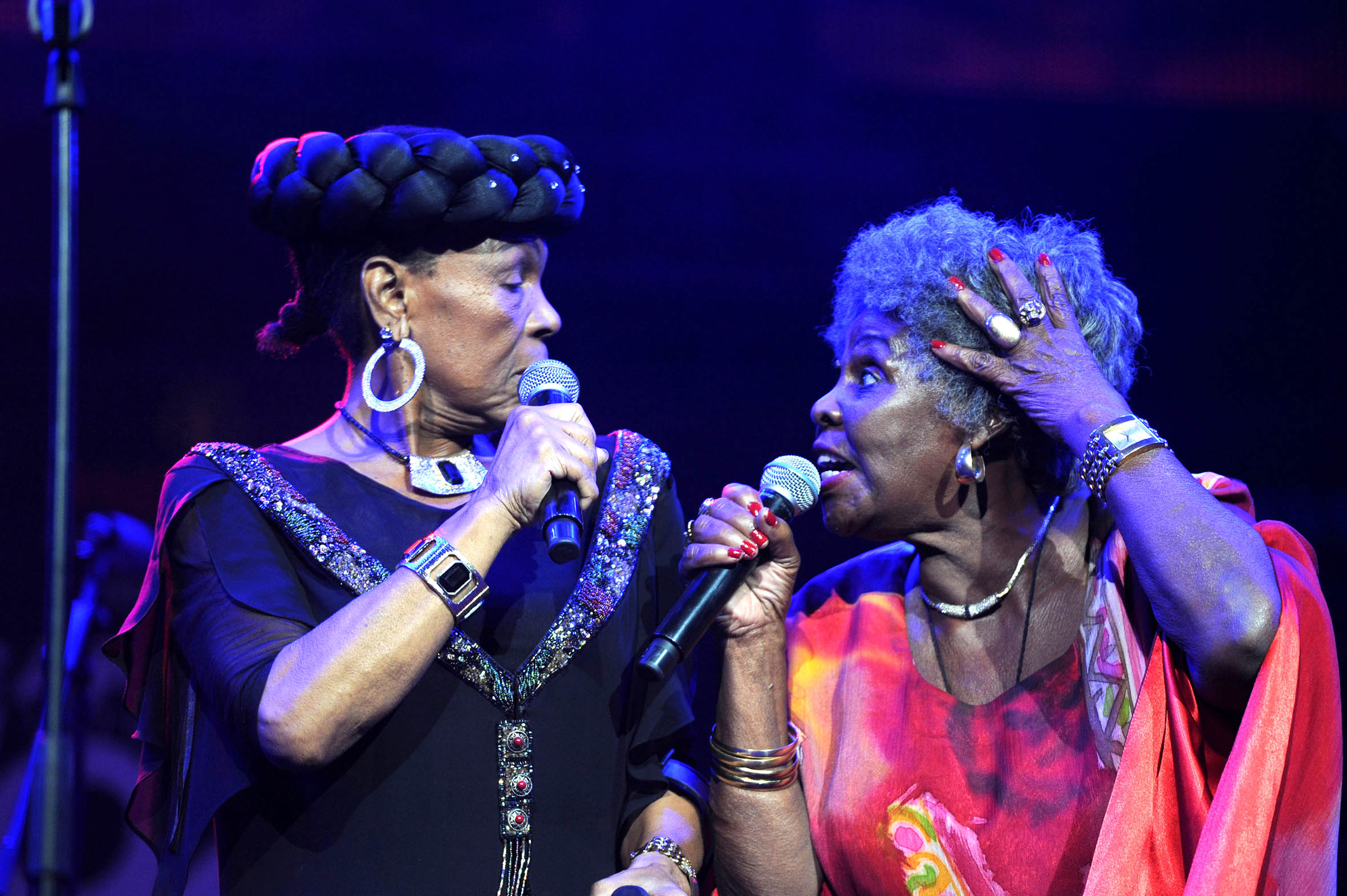As a writer, Masuka was capable of creating songs that rendered clear images of black life without ever exploiting her people. Photo: Madelene Cronje
Dorothy Masuka arrives at the Soweto Hotel and orders a cup of rooibos. She is coming down with flu and tells me she needs a little honey on her side to fight this war.
She is wearing a big black coat over a blouse with floral details. She is light on the make-up but not so much on the accessories. Her wrists are full of bands, bangles and beaded trinkets, which jingle as she talks with her hands, which is all she does. Punctuating sentences with a fist, palms open and pressed against the table or rolling her knuckles.
It’s not difficult to notice the folds of her skin, each layer like a map mirroring the contours of her well-travelled feet. Immediately I start to feel self-conscious. I should have made more of an effort instead of wearing jeans and a plain white T-shirt. But here we are anyway.
We make our way to the hollow restaurant to begin a conversation that has been months in the making. It’s the middle of October and there is a warm breeze in this part of the world. We had been trying to connect since May.
The idea had started with a photo. You might have seen the one. Black-and-white, with rich shadows, taken by Themba Ndala at Hugh Masekela’s memorial at the University of Johannesburg campus. Masuka, looking reticent, her eyes half closed over a wry smile and, opposite her, mam’ Abigail, shades on and arms folded. It is a curious image. One that made me wonder about the inner workings of a friendship five decades in the making.
The details of Masuka’s life are well known. Singer-songwriter, born in 1935 to a Zambian father who was a chef and the Zulu woman who caught his eye. Both were immigrants who had settled in Zimbabwe and found each other. Mother, father and their four children would later move to South Africa because of Dorothy’s constant ill health.
“I wasn’t meant to live this long,” she says. “I was a sickly baby but look at me, living and beautiful. That’s a blessing.”
Her long life is what has allowed her to give us a mine of music and a career unmatched in its generosity. As a teenager, Masuka turned her back on her Catholic education to pursue a life behind the mic. But it wasn’t just the music that drew her away from education. She admits she was having something of an existential crisis. “I had started to question what could it possibly mean that a living god who sees all things could allow black people to be treated like we were being treated. It was hard for me so I had to see if there was something else.”

Mam’ Dorothy left her Catholic education in pursuit of life on stage. Photo: Madelene Cronje.
This constant questioning led Masuka to run away many times, including to Durban, where she would join the Ink Spots, then under the tutelage of Philemon Magotsi.
“I did eventually find my way back to God but, mostly, it was after my two children died. That was a trying time so I needed an anchor.”
Although she now lives in Yeoville (since 1992), the intangible nature of home was a recurring villain in Masuka’s musical universe.
“Home is a myth and, at some point, I had to accept that. I have lived in so many places and I have just learned to accept that you belong where you are.”
Masuka had realised from a young age that she was cursed with a golden voice and the attitude of a reluctant star. Although she gained a reputation for being a capable and controlled performer, Masuka the songwriter is where you find the most interesting versions of herself.
Pata Pata, the song made famous by Miriam Makeba, she wrote that. Khawuleza, Masekela’s cunning ode to women who brew beer and the dirty apartheid cops they despise, she wrote that too. As a writer, Masuka was capable of creating songs that rendered clear images of black life without ever exploiting her people. Her voice is not so much sound as it is oil on wood. Even the slightest change of angle reveals a new shade of glimmer.
She’s still talking with her hands and slams her left palm gently on the table for what is not the first time during our conversation. This time, she knocks her cup of rooibos ever so slightly and some of it spills on the table. I offer her a page from my notebook, which she folds in half and wipes the tea, before she has to embarrass herself by confessing to the waiter what she has done.
Perhaps the true crowning achievement of Masuka’s life is her long-term friendship with Abigail Kubeka. The two had frequently bumped into each other while working and singing in the local shebeens.

Enduring: The close friendship between Dorothy Masuka and Abigail Kubeka was based on shared values, music and good times and began in the days when they sang in shebeens. Photo: Lerato Maduna/ Gallo Images/ City Press
“What I remember about her that made her stand out is that she had this walk. She always walked straight, never swerved and always with her chin up.”
So how did we get from that to the picture of them at Bra Hugh’s memorial, five decades later?
Well, for one, she and Kubeka decided very early on that their friendship would not be based on guilt or insecurity, as most friendships are.
“People in music want you to play small so you can make them feel better. That’s why you see so many bands break up no matter how talented they are. At a certain point, I think we had been fighting about who was going to go first at this show we were performing at. We just decided, enough! We’re not going to do that to each other. We need each other.”
Their enduring friendship is confirmation of one vital truth — that no workshop or tutorial can take the place of vital contact with a creative soul with whom you share values. And that is what Masuka and Kubeka share: values, songs, drinks and everything in between. A kind of closeness that forms a loop.
In adulthood, friendships are often destroyed as a result of the shame society imposes on cliques. But the real power of Masuka and Kubeka as a clique is how innocuous and user-friendly their friendship always was. It was not bound merely by music or shared political beliefs but also by things as petty as gossiping.
“We gossip all the time and laugh a lot. You think we’re just spending every day talking about music. God no, that would be too depressing. All our peers are dead.”
We often drift away from each other because it is simply easier than seeing the people we love realise that we are not exactly who we had imagined we would become. To have our friends know and accept this reality is a very private and personal embarrassment. One that we often avoid by cutting off our friendships below the knee so they do not chase and haunt us into adulthood.
The average friendship lasts about seven years, according to sociologist Gerald Mollenhorst of Utrecht University in the Netherlands. Seven years. This is alarming enough. But what is equally interesting is that, if the friendship lasts more than seven years, it usually lasts a lifetime.
Masuka was not ashamed of her squad of friends, which included Thandi Klaasen, Makeba and Dolly Rathebe. After all, it was these women who had seen her off when she went into exile and they sent her baskets of fruits and pictures from home. They had been there to help her to name her children and hold her hand during several health scares. They sang with her in times of despair and offered warm porridge when her children died and she was at the nadir of her life,” she says.
“My friendship with Abigail is probably the most important relationship of my life.”
Masuka and Kubeka are the last two standing, but Masuka is not afraid of death. I confess my personal fear of dying. “That’s because you don’t have a clear conscience,” she jokingly mocks. She isn’t wrong; I’m still working on that.
We spend the last few minutes of the interview talking about Caiphus Semenya, whose picture hangs not too far from where we’re sitting, and one thing is clear: Masuka is a music nerd.
“I wish I had written Nomalanga. I am still shaken by the depth of the writing and the clarity of his [Caiphus’s] voice. It’s like it was this special thing that was sent by the ancestors.”
It’s funny; I want to write in my notebook how I think that’s how we feel about her. But I can’t. The remainder has been torn.